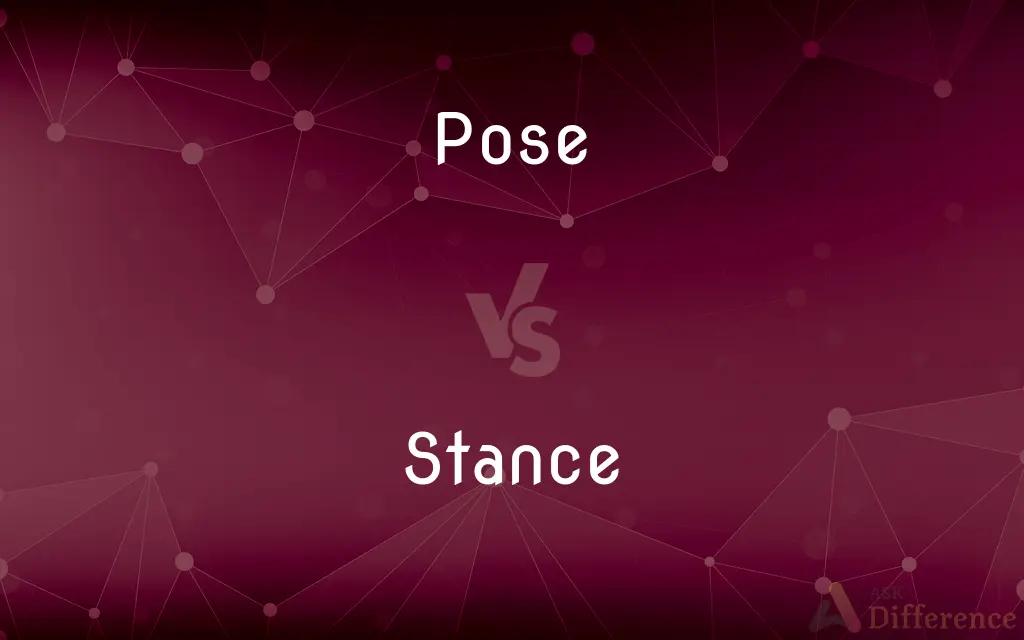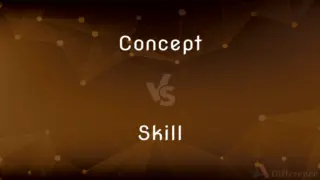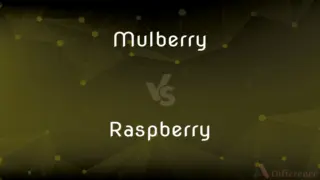Pose vs. Stance — What's the Difference?
Edited by Tayyaba Rehman — By Maham Liaqat — Updated on May 3, 2024
Pose refers to a deliberate body positioning for artistic, photographic, or expressive purposes, while stance denotes a person's physical or metaphorical positioning on an issue or in a physical space.

Difference Between Pose and Stance
Table of Contents
ADVERTISEMENT
Key Differences
Pose involves intentional arrangement of the body, often used in photography or modeling to convey a particular image or emotion; whereas stance is generally more about one's physical or ideological positioning, reflecting attitudes or beliefs.
In photography, a pose is crucial for capturing the subject in a flattering or meaningful way, highlighting emotions or aesthetics; on the other hand, a stance might refer to the way a person physically stands, which can subtly communicate non-verbal cues about their state of mind or feelings.
Artists often instruct subjects to adopt a specific pose to tell a story or emphasize certain features, while a stance, especially in debate or discussion, represents a person's point of view or argument on a particular matter.
While pose is used predominantly in contexts requiring control and aesthetics such as dance, art, and photography, stance is used both in physical contexts (how one stands) and in expressing viewpoints or opinions on various issues.
The term pose can also metaphorically imply a pretense or an affectation, suggesting insincerity; in contrast, stance is typically associated with genuine positions or beliefs, indicating a deeper level of conviction or understanding.
ADVERTISEMENT
Comparison Chart
Definition
An arranged position of the body
A way of standing or a mental position
Usage in context
Art, photography, modeling
Physical posture, opinions
Connotations
Artistic, expressive, sometimes false
Firm, physical, opinionated
Purpose
Aesthetics, expression
Expression, support of ideas
Examples
Model posing for a photo
Taking a stance on political issues
Compare with Definitions
Pose
A deliberate posture with the intention of being photographed.
She struck a dramatic pose at the beach for her photo shoot.
Stance
A mental or ethical position on a specific issue.
His stance on environmental policies is very strict.
Pose
A physical state arranged for artistic purposes.
The dancer’s pose emphasized her flexibility.
Stance
A way of holding one’s body when standing.
Her stance was confident, with hands on hips.
Pose
Positioning of the body in a staged manner.
The yoga instructor demonstrated the next pose.
Stance
A position from which one views or approaches an issue.
The politician’s stance was clearly outlined during the debate.
Pose
To present oneself insincerely.
He posed as a wealthy investor to gain trust.
Stance
A typical posture for a specific activity, like sports.
The golfer adjusted his stance before swinging.
Pose
An act intended to impress or mislead.
His kindness was just a pose to garner favor.
Stance
A physical or metaphorical posture adopted.
The company’s stance on inclusivity is well documented.
Pose
Present or constitute (a problem or danger)
The sheer number of visitors is posing a threat to the area
Stance
The attitude or position of a standing person or animal, especially the position assumed by an athlete preparatory to action.
Pose
Assume a particular position in order to be photographed, painted, or drawn
The prime minister posed for photographers
Stance
A position or point of view
"Peru ... toughened its stance toward foreign investors" (Abraham Lowenthal).
Pose
Pretend to be (someone or something)
An armed gang posed as policemen to ambush a postman
A literary novel posing as a spy thriller
Stance
The manner, pose, or posture in which one stands.
The fencer’s stance showed he was ready to begin.
Pose
Behave affectedly in order to impress others
Some people like to drive kit cars, but most just like to pose in them
Stance
One's opinion or point of view.
I don’t agree with your stance on gun control.
Pose
Puzzle or perplex (someone) with a question or problem
We have thus posed the mathematician and the historian
Stance
A place to stand; a position, a site, a station.
Pose
A way of standing or sitting, especially in order to be photographed, painted, or drawn
Photographs of boxers in ferocious poses
Stance
A foothold or ledge on which to set up a belay.
Pose
A particular way of behaving adopted in order to impress or to give a false impression
The man dropped his pose of amiability
Stance
(Scotland) A place for buses or taxis to await passengers; a bus stop, a taxi rank.
Pose
To set forth in words for consideration; propound
Pose a question.
Stance
(Scotland) A place where a fair or market is held; a location where a street trader can carry on business.
Pose
To present or constitute
A crisis that posed a threat to the country's stability.
Stance
A stanza.
Pose
To place (a model, for example) in a specific position.
Stance
To place, to position, to station; (specifically) to put (cattle) into an enclosure or pen in preparation for sale.
Pose
To assume or hold a particular position or posture, as in sitting for a portrait.
Stance
A stanza.
Pose
To represent oneself falsely; pretend to be other than what one is
Conmen posing as police officers.
Stance
A station; a position; a site.
Pose
To puzzle, confuse, or baffle.
Stance
The position of a player's feet, relative to each other and to the ball, when he is making a stroke or at bat.
Pose
A bodily attitude or position, such as one assumed for an artist or a photographer.
Stance
The mental attitude, position, or approach a person adopts in respect to something.
Pose
In yoga, an asana.
Stance
Standing posture
Pose
A studied or artificial manner or attitude, often assumed in an attempt to impress or deceive others.
Stance
A rationalized mental attitude
Pose
(archaic) Common cold, head cold; catarrh.
Pose
Position, posture, arrangement (especially of the human body).
Please adopt a more graceful pose for my camera.
Pose
Affectation.
Pose
(transitive) To place in an attitude or fixed position, for the sake of effect.
To pose a model for a picture.
Pose
(transitive) To ask; to set (a test, quiz, riddle, etc.).
Pose
(transitive) To constitute (a danger, a threat, a risk, etc.).
Pose
To falsely impersonate (another person or occupation) primarily for the purpose of accomplishing something or reaching a goal.
Pose
(intransitive) To assume or maintain a pose; to strike an attitude.
Pose
(intransitive) To behave affectedly in order to attract interest or admiration.
Pose
To interrogate; to question.
Pose
To question with a view to puzzling; to embarrass by questioning or scrutiny; to bring to a stand.
Pose
(obsolete) To ask (someone) questions; to interrogate.
Pose
To puzzle, non-plus, or embarrass with difficult questions.
Pose
To perplex or confuse (someone).
Pose
Standing still, with all the feet on the ground; - said of the attitude of a lion, horse, or other beast.
Pose
A cold in the head; catarrh.
Pose
The attitude or position of a person; the position of the body or of any member of the body; especially, a position formally assumed for the sake of effect; an artificial position; as, the pose of an actor; the pose of an artist's model or of a statue.
Pose
To place in an attitude or fixed position, for the sake of effect; to arrange the posture and drapery of (a person) in a studied manner; as, to pose a model for a picture; to pose a sitter for a portrait.
Pose
To assume and maintain a studied attitude, with studied arrangement of drapery; to strike an attitude; to attitudinize; figuratively, to assume or affect a certain character; as, she poses as a prude.
He . . . posed before her as a hero.
Pose
To interrogate; to question.
Pose
To question with a view to puzzling; to embarrass by questioning or scrutiny; to bring to a stand.
A question wherewith a learned Pharisee thought to pose and puzzle him.
Pose
Affected manners intended to impress others;
Don't put on airs with me
Pose
A posture assumed by models for photographic or artistic purposes
Pose
A deliberate pretense or exaggerated display
Pose
Introduce;
This poses an interesting question
Pose
Assume a posture as for artistic purposes;
We don't know the woman who posed for Leonardo so often
Pose
Pretend to be someone you are not; sometimes with fraudulent intentions;
She posed as the Czar's daughter
Pose
Behave affectedly or unnaturally in order to impress others;
Don't pay any attention to him--he is always posing to impress his peers!
She postured and made a total fool of herself
Pose
Put into a certain place or abstract location;
Put your things here
Set the tray down
Set the dogs on the scent of the missing children
Place emphasis on a certain point
Pose
Be a mystery or bewildering to;
This beats me!
Got me--I don't know the answer!
A vexing problem
This question really stuck me
Common Curiosities
What is the main difference between a pose and a stance?
Pose generally refers to an arranged body position, often for artistic purposes, whereas stance refers to both physical posture and a viewpoint on issues.
How is "pose" used in professional photography?
In photography, pose is critical for framing a subject in a way that is aesthetically pleasing or expressive.
Can the term "pose" have negative connotations?
Yes, "pose" can imply insincerity or affectation, as in posing to impress or deceive others.
Can someone's stance change over time?
Yes, a person's stance on issues can evolve based on new experiences, information, or changes in perspective.
How can understanding someone's stance be beneficial?
Understanding someone’s stance can aid in predicting their reactions, crafting persuasive arguments, or fostering collaboration, especially in debates, negotiations, or discussions.
Is "stance" used more in physical or ideological contexts?
Stance is used in both contexts but is particularly prevalent in discussions of opinions and beliefs.
Are there specific industries or fields where the concept of a stance is particularly important?
In politics, sports, and any form of debate or advocacy, the concept of a stance is crucial as it defines one's approach, strategies, and underlying beliefs.
Can a pose be natural or are all poses considered artificial?
While many poses are deliberately arranged, natural poses also exist, especially in candid photography or when individuals are absorbed in their tasks and unaware of being observed.
Can a stance be non-verbal?
Absolutely, non-verbal stances include body language like posture, facial expressions, and other physical gestures that communicate attitudes or feelings without words.
What are typical situations where one would use the term "pose"?
The term "pose" is frequently used in contexts involving photography, modeling, art, and dance where body arrangement is essential for expression or aesthetic appeal.
What does it mean when someone is accused of "striking a pose"?
This often implies that the person is behaving in a way that is not genuine but designed to impress or influence others, suggesting affectation.
Why is flexibility in one's stance important in discussions or negotiations?
Flexibility in stance allows for adjustments based on dialogue and new information, facilitating compromise and the achievement of mutual goals in discussions or negotiations.
What skills are necessary to effectively pose someone for a photograph?
Skills needed include an understanding of body language, aesthetics, lighting, and the ability to make the subject feel comfortable and confident in their pose.
Is there a positive connotation associated with taking a firm stance on an issue?
Yes, taking a firm stance is often viewed positively as it indicates clarity, commitment, and integrity in one’s beliefs or principles.
How do cultural perceptions influence the interpretation of different poses?
Cultural backgrounds can significantly influence how poses are interpreted, with certain gestures or body arrangements carrying unique meanings or connotations in different societies.
Share Your Discovery

Previous Comparison
Concept vs. Skill
Next Comparison
Mulberry vs. RaspberryAuthor Spotlight
Written by
Maham LiaqatEdited by
Tayyaba RehmanTayyaba Rehman is a distinguished writer, currently serving as a primary contributor to askdifference.com. As a researcher in semantics and etymology, Tayyaba's passion for the complexity of languages and their distinctions has found a perfect home on the platform. Tayyaba delves into the intricacies of language, distinguishing between commonly confused words and phrases, thereby providing clarity for readers worldwide.
















































